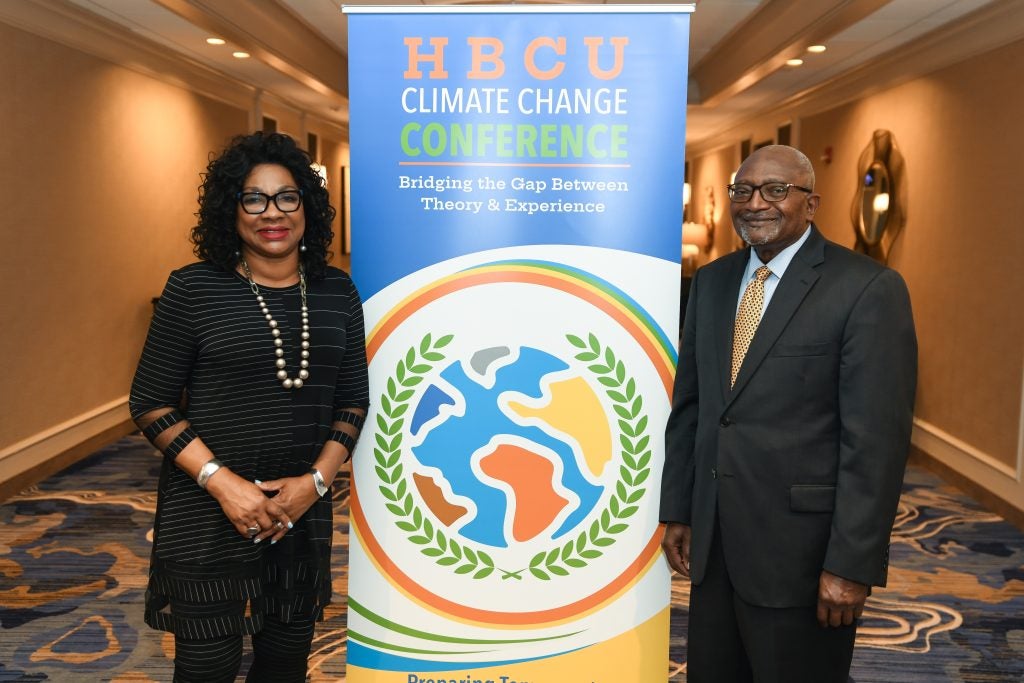50 years is too long! Now is our time to go bold or go home.

“50 Years is Enough!”
That was the theme at this year’s 8th Annual Historically Black Colleges and Universities (HBCU) Climate Change Conference in New Orleans. 50 years of indiscriminate toxic dumping, 50 years of hazardous waste sites in frontline communities, 50 years of land-use decisions that harm communities of color – enough! It’s a searing message for attendees and a reminder that shines a light on the emergence of the movement from the 1960s and 1970s, in reaction to discriminatory environmental practices.
The conference began with a painful trip down memory lane, focused on the trials of environmental racism that befell Black communities in the 1960s. Event organizers discussed how imperative it is for policymakers to act in a way that helps ensure that communities have agency and ownership of their own future. The conference highlighted the long history of systemic racism that lies behind the environmental injustices that communities have faced for so many years. It also fueled a fire inside the movement’s trailblazers who spoke at the conference, forcing them to declare that enough is enough. We are fighting back!
Conference Overview
Hosted by the Deep South Center for Environmental Justice (DSCEJ) and Texas Southern University, the event featured a series of keynote presentations from DSCEJ founder Dr. Beverly Wright, the renowned father of environmental justice Dr. Robert Bullard, and Peggy Shephard, activist and founder of WE ACT for Environmental Justice.
Recently, Dr. Bullard, Dr. Wright and Ms. Shephard have joined the Biden Administration’s newly formed White House Environmental Justice Advisory Council, dedicated to bringing greater visibility to environmental justice issues across the federal government.
Additionally, these three advocates have received a combined total of $14 million from the Bezos Earth Fund, a commitment of $10 billion to be disbursed as grants within the current decade in order to limit climate change and preserve nature. These three pioneers were delighted to share that these funds will help pilot their new Engage, Enlighten and Empower program, aimed at holding the Biden administration accountable for carrying out its new Justice40 initiative – a promise to deliver at least 40% of the overall benefits from federal investments in climate and clean energy to underserved communities. The purpose of this initiative is to advocate for solutions that bring environmental justice to communities affected by pollution and climate inaction.
Years of oppression from systemic racism have made the need for focused, dedicated programs with equitable climate solutions a high priority.
“Your zip code is the most powerful predictor of health and well-being. Where you live can affect your quality of life,” Dr. Bullard told the attendees. It is absolutely tragic to think that where you live is often a death sentence. But it is the reality in many parts of America, and this too must change.
New advocates on the frontlines
The fight against climate injustice has increased in past years, creating a growing network of supporters.
Other conference speakers such as EDF’s Heather Toney, as well as community activists, expert panelists and conservation groups across the United States have made advocating for fair and sustainable climate solutions their long-term mission.
Panel experts shared that over 156 petrochemical plants located 80 miles between New Orleans and Baton Rouge collectively release as many cancerous chemicals as the entire state of Texas. Many of these refineries are located directly across from Black and Brown neighborhoods. Unfortunately, children are often seen playing in parks across from these refineries —a painful reality of the inequities facing many communities across the southern states.
Community activist Sharon Lavigne founded RISE St. James, a grassroots organization located in St. James Parish, Louisiana, in order to block the rapid increase of harmful petrochemical companies in that community. Louisianians often refer to this area as “cancer alley” due to the heavy pollution from the surrounding chemical plants.
With many citizens fed up with Parish leaders for not taking a stand against these companies, they quickly galvanized behind Sharon, and together they were able to successfully defeat the construction of a $1.25 billion plastics manufacturing plant in 2019.
However, it seems that these victories never last long. “Every day petrochemical companies like Formosa Plastics try to find a new way to build in our community,” said Ms. Lavigne. Thankfully, organizations like RISE St. James continue to fight for the right to live free of harmful plastic pollution and other climate effects, despite the pushback from larger companies.
Other unjust practices such as redlining and government negligence reinforce the reality that as the climate crisis worsens, communities of color will only feel these impacts more frequently and with more intensity than their white counterparts. As Dr. Bullard reminded attendees bluntly, “some communities have the wrong complexion for protection.”
Going bold on climate justice for all
As a sponsor of the conference, EDF is uniquely situated to amplify efforts that advocate specifically for equitable climate action for all. We have seen how mission-focused EDFers are when it comes to fighting climate change. Now, there is the chance to make good on that passion and move forward using proactive, comprehensive resilience planning and strategies at the federal, state and local levels.
Proactive examples of where EDF is making strides include:
- Working to increase equity and resilience for all coastal communities by addressing disproportionate flood risk with policies and solutions that advance equity and resilience for all.
- Partnering with Black Millennials for Flint, a grassroots organization fighting against the crisis of lead exposure in African American and Latinx communities throughout the nation.
- Establishing a new community-centered solar power and storage pilot project aimed at creating energy independence in the city of Culebra ahead of this year’s hurricane season, with a goal to eventually advance climate resilience throughout the entire Caribbean.
Support from communities, legislators, grassroots organizers and policymakers will be vital to accomplishing this work. In the wise words of Heather Toney, “collaboration and partnership are essential. We can’t do this work by ourselves.”
My hope is that as time goes by, EDF will be right alongside our partners on the ground, working collaboratively to advocate and fight for just and equitable solutions that benefit all underserved populations. Now is the time to go bold on climate justice for all. 50 years is enough!











